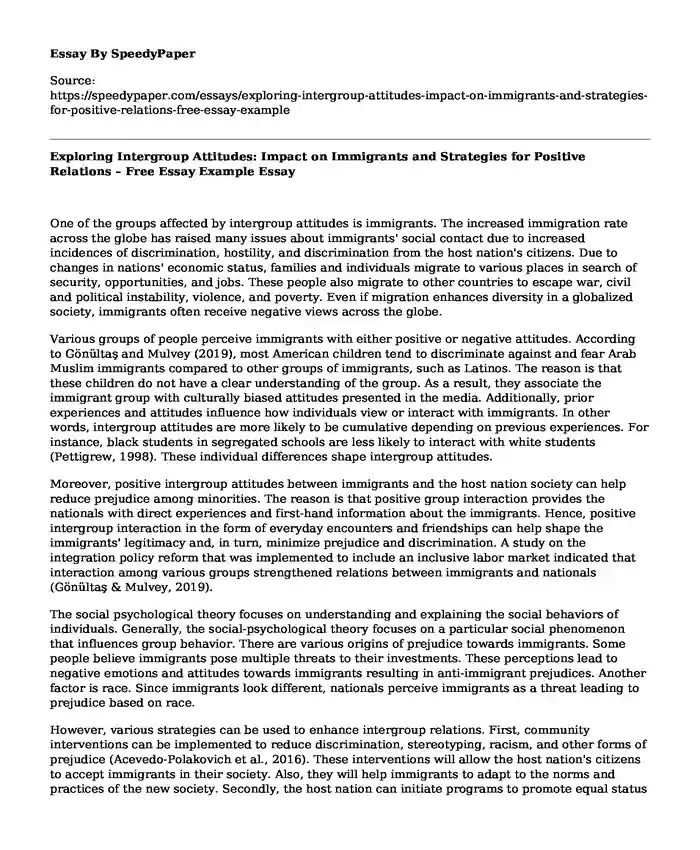
| Type of paper: | Essay |
| Categories: | Psychology Immigration Society |
| Pages: | 3 |
| Wordcount: | 631 words |
One of the groups affected by intergroup attitudes is immigrants. The increased immigration rate across the globe has raised many issues about immigrants' social contact due to increased incidences of discrimination, hostility, and discrimination from the host nation's citizens. Due to changes in nations' economic status, families and individuals migrate to various places in search of security, opportunities, and jobs. These people also migrate to other countries to escape war, civil and political instability, violence, and poverty. Even if migration enhances diversity in a globalized society, immigrants often receive negative views across the globe.
Various groups of people perceive immigrants with either positive or negative attitudes. According to Gönültas and Mulvey (2019), most American children tend to discriminate against and fear Arab Muslim immigrants compared to other groups of immigrants, such as Latinos. The reason is that these children do not have a clear understanding of the group. As a result, they associate the immigrant group with culturally biased attitudes presented in the media. Additionally, prior experiences and attitudes influence how individuals view or interact with immigrants. In other words, intergroup attitudes are more likely to be cumulative depending on previous experiences. For instance, black students in segregated schools are less likely to interact with white students (Pettigrew, 1998). These individual differences shape intergroup attitudes.
Moreover, positive intergroup attitudes between immigrants and the host nation society can help reduce prejudice among minorities. The reason is that positive group interaction provides the nationals with direct experiences and first-hand information about the immigrants. Hence, positive intergroup interaction in the form of everyday encounters and friendships can help shape the immigrants' legitimacy and, in turn, minimize prejudice and discrimination. A study on the integration policy reform that was implemented to include an inclusive labor market indicated that interaction among various groups strengthened relations between immigrants and nationals (Gönültas & Mulvey, 2019).
The social psychological theory focuses on understanding and explaining the social behaviors of individuals. Generally, the social-psychological theory focuses on a particular social phenomenon that influences group behavior. There are various origins of prejudice towards immigrants. Some people believe immigrants pose multiple threats to their investments. These perceptions lead to negative emotions and attitudes towards immigrants resulting in anti-immigrant prejudices. Another factor is race. Since immigrants look different, nationals perceive immigrants as a threat leading to prejudice based on race.
However, various strategies can be used to enhance intergroup relations. First, community interventions can be implemented to reduce discrimination, stereotyping, racism, and other forms of prejudice (Acevedo-Polakovich et al., 2016). These interventions will allow the host nation's citizens to accept immigrants in their society. Also, they will help immigrants to adapt to the norms and practices of the new society. Secondly, the host nation can initiate programs to promote equal status among out-group and in-group members. In that way, both groups can work towards common goals resulting in meaningful interactions between the groups. Lastly, all members of the groups can form friendships across group lines. By implementing these strategies, all groups can interact independently with one another, enabling information sharing and self-disclosing. All these actions eliminate all the perceived threats and, in turn, accelerate the elimination of prejudices.
References
Acevedo-Polakovich, I. D., Beck, K. L., Hawks, E., & Ogdie, S. E. (2016). Toward a relevant psychology of prejudice, stereotyping, and discrimination: Linking science and practice to develop interventions that work in community settings. In A. N. Alvarez, C. T. H. Liang, & H. A. Neville (Eds.), The cost of racism for people of color: Contextualizing experiences of discrimination, 317-337. doi:10.1037/14852-015
Gönültas, S., & Mulvey, K. L. (2019). Social-Developmental Perspective on Intergroup Attitudes towards Immigrants and Refugees in Childhood and Adolescence: A Roadmap from Theory to Practice for an Inclusive Society. Human Development, 63(2), 90-111. https://www.karger.com/Article/FullText/503173
Pettigrew, T. F. (1998). Intergroup contact theory. Annual Review of Psychology, 49, 65-85. doi: 10.1146/annurev.psych.49.1.65
Cite this page
Exploring Intergroup Attitudes: Impact on Immigrants and Strategies for Positive Relations - Free Essay Example. (2024, Jan 30). Retrieved from https://speedypaper.com/essays/exploring-intergroup-attitudes-impact-on-immigrants-and-strategies-for-positive-relations-free-essay-example
Request Removal
If you are the original author of this essay and no longer wish to have it published on the SpeedyPaper website, please click below to request its removal:
- Friends of Life Essay Samples
- Essay Samples on Human Development and Human Behavior
- Essay Example. Women and Gender Studies
- Racism in the Adventures of Huckleberry Finn. Free Essay
- Free Essay Sample: Adolescents and Bullying
- Essay Sample on Stress Assessment and Teaching Plan
- Free Paper Sample on Police Brutality to African Americans
Popular categories




